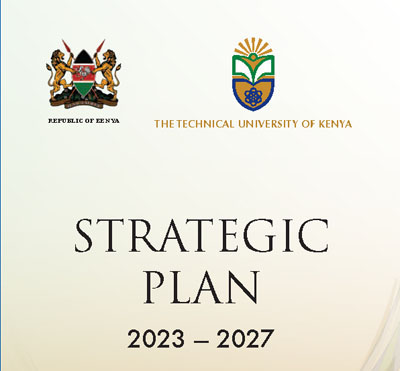TU-K may soon enter a collaboration with the University of Juba (UoJ). Prof. Andrew Kiri Amegovu, the Director in-charge of Research and Publication at UoJ, led a delegation that recently visited TU-K for benchmarking. Deputy Vice-Chancellor in-charge of Institutional Advancement and Enterprises (IAE), Prof. Paul Wambua, along with his counterpart in charge of Research and Technology Development (RTD), Prof. Isaac Orina received the visitors.
Prof. Wambua explained that TU-K had distinguished herself from other universities as a premier institution in technical education. He explained that the university was committed to producing hands-on graduates and gives diploma and certificate holders a chance to upgrade to degree level.
Prof. Amegovu, acknowledged that TU-K had played an important role in TVET and therefore his university was keen on borrowing the best practices. He added that the University of Juba would be interested in collaborating with TU-K by way of signing an MoU.
Prof. Amegovu informed participants that the University of Juba intended to start a Diploma programme in Food Technology, funded by the African Development Bank (ADB) and the Government of South Sudan. Therefore, the visit was meant to find out how TU-K trains students in similar programmes.
He emphasised that his Government was keen in training practically-oriented personnel and therefore bridge a gap that hinders economic development.
Prof. Wambua spoke about the CNC Machines and equipment in the University laboratories and workshops, noting that they had played a pivotal role in training and providing students with skills needed to drive the economy.
“It is worth noting that Industries are keen on employing graduates of TU-K because of our history of training hands on skills. With the equipment and expertise, we have, I believe there is a lot we can share for instance, in Engineering and Space Science,” said Prof. Wambua.
Dr. Christopher T. Gore, Associate Professor from School of Applied and Industrial Sciences and project coordinator, noted that his team would be interested in learning the activities of TU-K and understanding the importance of TVET. He noted that they are keen on developing a curriculum that will be acceptable in the region and purchasing of laboratory equipment and facilities that will suit the training.
Prof. Orina informed the delegation that quite a good number of students from South Sudan are in TU-K and some are taking active role in students’ politics and leadership.
“The current student leader representing International students is from South Sudan. We have many others pursuing different programmes and we are happy to be a leading institution in the region.”
Talking about the Industry Based Learning (IBL) programme, the DVC explained that it is a revolutionary plan by the University’s Faculty to have learners, and in some cases, members of staff, spend time in industry to sharpen their skills in the real world.
He explained that TU-K produces not only thinkers and designers but also innovators and technopreneurs.
“The university has partnership with relevant industry players in the academic, manufacturing and service sectors and this involves highly hands-on approach to teaching and learning.“


